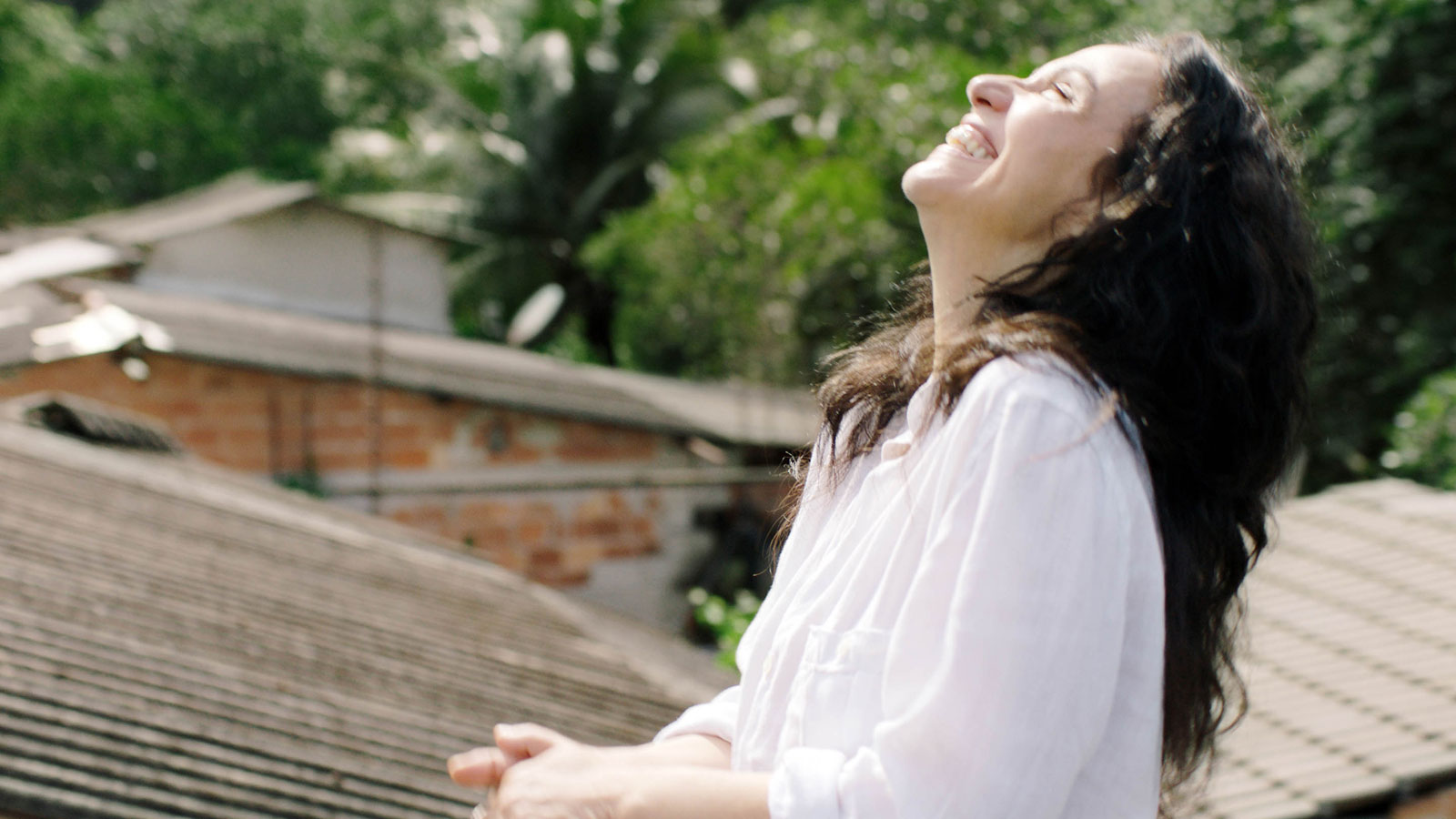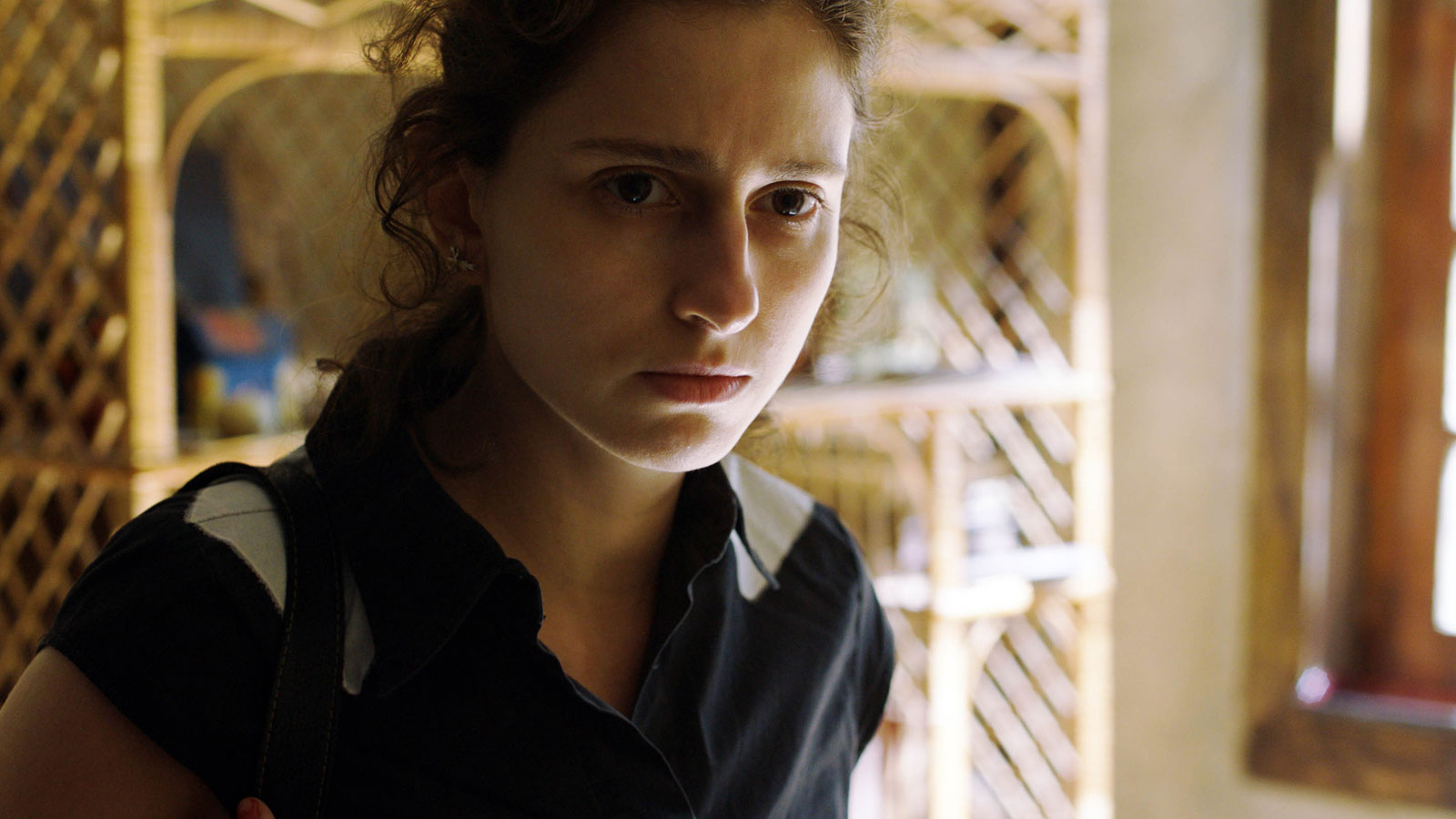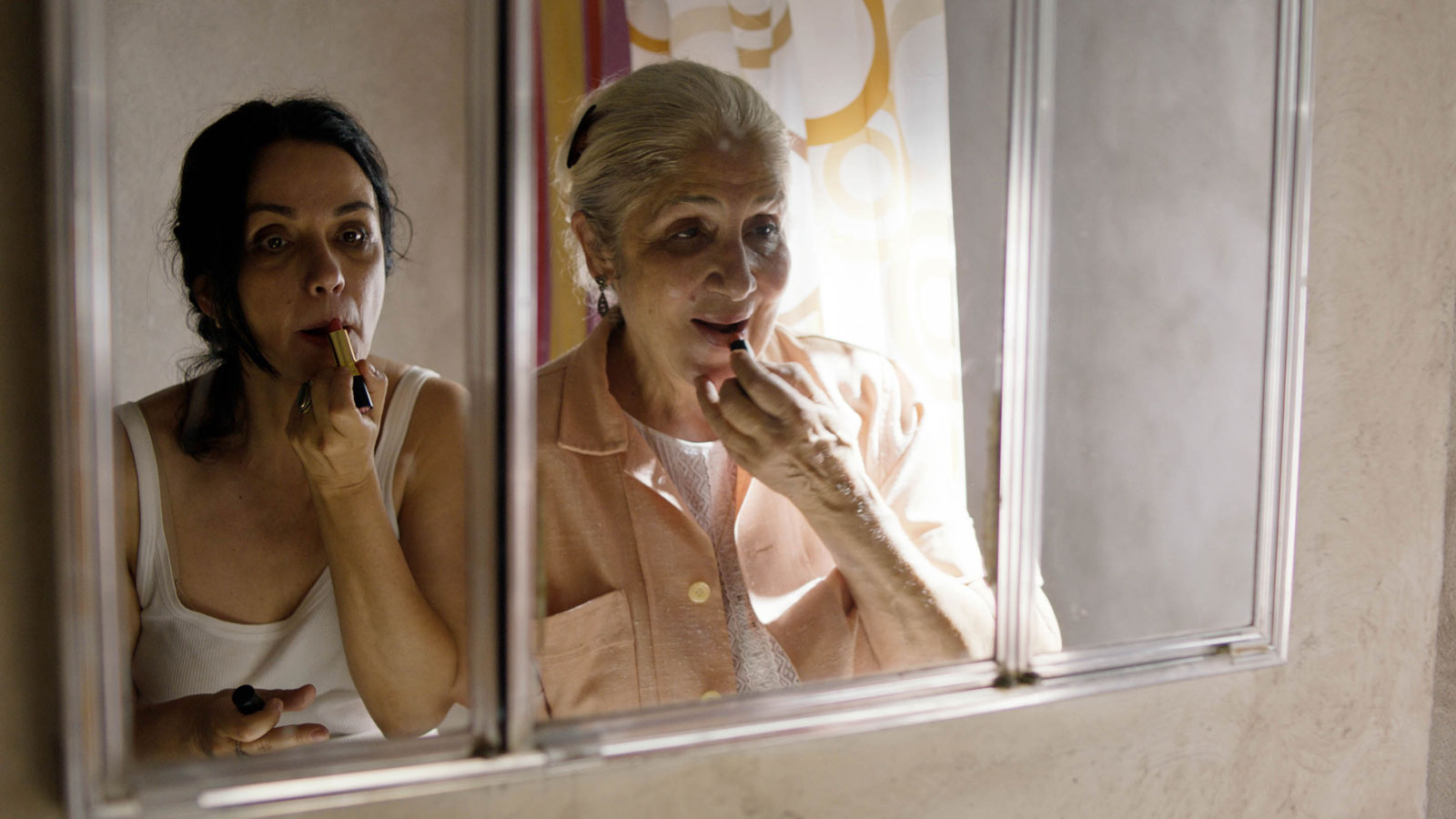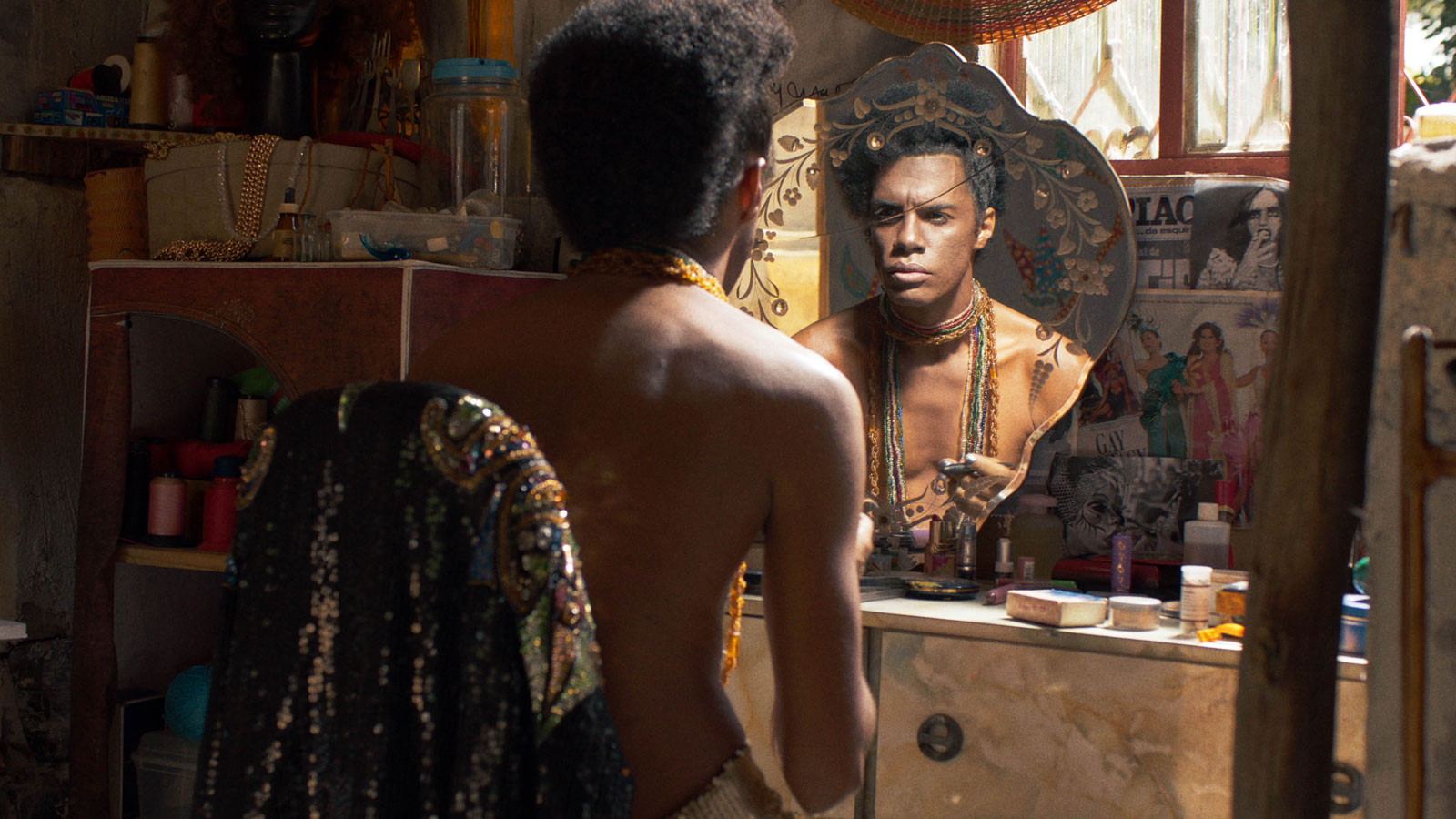Malu – Four Ways

The live-editing workshop is an integral part of each year’s Critics Campus, and this year, four members of the cohort were assigned Pedro Freire’s resonant portrait Malu. After penning their reviews, the participants sat through an intensive revision session with essayist and critic Cher Tan. Read their final reviews below.
By Daniel Tune
Malu director Pedro Freire makes his intentions plain from the film’s opening shot: a long, shaky take of a middle-aged woman cackling wildly as she recites Shakespeare. Her energetic delivery is joyous to watch, but her manic laughter is also unsettling. This emotional ambiguity is characteristic of this Brazilian drama’s strongest moments.
The woman is the titular Malu (Yara de Novaes), a faded theatre actor and former student revolutionary whom we meet languishing in a favela on the outskirts of Rio de Janeiro. Living with her elderly mother Lili (Juliana Carneiro da Cunha), a devout Catholic, Malu styles herself as a countercultural provocateur in her isolated community. This initially plays out as humorous: Lili calls in a priest to curb her daughter’s excessive cannabis consumption, and Malu responds by admonishing the holy man with accusations of paedophilia, crying, “Jesus was a communist!” The comedy here is raucous, but it quickly turns sour when mother and daughter launch into a violent altercation.
This unsteady atmosphere carries over to the arrival of another daughter: Malu’s own estranged child, Joana (Carol Duarte). Joana is an actor in her mid twenties, and a more successful one than her mother – a barely acknowledged fact that hangs over the pair’s reunion. Malu feels most poignant in these early scenes of tentative mother–daughter bonding. Inescapable traumas lurk on the edges of scenes that otherwise hum with the easy laughs of a long-awaited family gathering. When Malu regales Joana with tales of bygone sexual escapades, her bawdy story is undeniably charming, but the desperation in her posturing reveals a shattered soul. This sensitivity to multilayered family dynamics is the film’s most commendable quality, as Freire’s light-touch direction allows deep emotion to seep through the cracks of small gestures.
The quiet resentments of the first half eventually boil over into ragged screaming matches, heavily reminiscent of the films of John Cassavetes – an influence Freire has cited openly. There’s an undeniable force in these scenes, but they feel disappointingly obvious in comparison to the film’s earlier emotional complexity. It’s difficult to accuse the work of inauthenticity; Freire has been open about the film’s autobiographical bent, and many of the most shocking moments come directly from his own lived experience. Still, the film loses sight of its emotional complexity when it settles into this more hackneyed dramatic formula. Though its depiction of family tensions are nuanced, Malu’s ultimately conventional path leaves it less memorable than its early scenes suggest.

Malu
By Isabella Gullifer-Laurie
In Brazilian director Pedro Freire’s debut feature film Malu, all the world’s a stage, a retired actor crowned the leading role in her own private drama. With untamed hair, her face thrust proudly into the sky, Malu (Yara de Novaes) laughs with wild and guttural abandon. Her lips twist into vocal exercises, pitching the seesawing sounds of vowels. With a whisper, she recites Hamlet’s famous soliloquy – the heartache and the thousand natural shocks that flesh is heir to. Into her mouth, she folds a finger gun; though it warps her speech, it does not stop her spittle. Malu stands tall on her roof, which overlooks a favela in Rio de Janeiro. With one step, Malu can stumble and fall; she is like a wheel rolling downhill, gathering speed.
Malu is an intergenerational drama based on Freire’s own family. It is concerned with the dalliances between the domestic and the theatrical. Malu is middle-aged, obnoxiously dragging her shod feet across the couch. She smokes pot in the middle of the day with her lover, a drag artist named Tibira (Átila Bee). She insults her mother, fondly called Miss Lili (Juliana Carneiro da Cunha) – a lady of great devotion dressed in beige nylons and a buttercream house dress, cherished rosary stuffed in her fist. Malu’s daughter, Joana (Carol Duarte), is an actor too, tight-laced and nervously poised in the wings, having recently returned from France. While these women seem to inhabit supporting roles in the long performance of Malu’s life, they are essential additions to this ensemble, adding texture to the smooth gloss of melodrama.
Freire constructs his film as a chamber piece. The house in which they live bears the burden of metaphor, a theatre in which Malu plays many roles: daughter, mother, fading diva, addict. Doors are ripped open and slammed shut – stage entrance left, exit right! The ceiling leaks; light refracts through dirty windows. The rooms are too hot; the women pull at their collars so as not to choke. The architecture corresponds with Malu’s moods, with grotty irritation and disdain rolling off her in feverish waves. She argues, delivering coarse lines with sensual aplomb, pitching physical blows on anyone within reach. She also tells stories: of her youth, her career, her lost loves, her politics.
Mealtime scenes mark the emotional arc of Malu, its characters at the mercy of an increasingly volatile love. At an early lunch with Joana, Malu’s cigarette smoke drifts across a table dressed in linens and flowers. The dulcet notes of dining music are offset by her vivid descriptions of fucking some young actor or another. In a later scene, Malu breaks the familial script, spitting out Lili’s rice flavoured with garlic, enraged by a cockroach crawling across the table. These moments are an attempt to mark and measure the escalation and descent of these relationships, disaster and resentment readily perceived.
Director, scriptwriter, mime artist, prima donna: Malu is all of these things, but she plays the shapeshifter so well as to disappear. It is only when a final role is handed to her – when the rug is finally pulled out from under her feet – that her vulnerability shines through. Maybe then it is too late: she can only ask Joana, “Where are we going?”, as if she has lost her script.

Malu
By Nicole Cadelina
We first meet the title character of Pedro Freire’s Malu standing on the rooftop of her house. She is a performer, priming her breath and body with an arsenal of vocal exercises and Shakespeare quotes. As Malu limbers up, we too prepare ourselves for the energy and momentum of the film.
Set in the outskirts of 1990s Rio de Janeiro, Freire’s debut drama is a rich and textured dedication to his late mother, actor Malu Rocha, who is brought to life by Yara de Novaes. Malu is as boldly irreverent as she is perversely entertaining, her words fiery and biting. She has been an actor, an activist and a radical – it’s as if she continues to live and breathe the art of provocation. There’s a performative glee, for instance, in how she ousts a priest with sacrilegious remarks, or even in her attempt to cause a scene over a plate of garlic rice.
Malu dreams of renovating her house into a public theatre precinct for locals in the favela. She has a strong, intimate friendship with the flamboyant Tibira (Átila Bee), a gay theatre actor who offers love, emotional support and a steady supply of joints. Her assertively Catholic mother, Lili (Juliana Carneiro da Cunha), is relegated into a shed after a heated argument. Meanwhile, Malu’s daughter, Joana (Carol Duarte), who is also a stage actress, is visiting from São Paulo to check in with her mother.
Freire delivers a lucid and darkly intimate portrait of the matriarch of his life that also illustrates Malu as both mother and daughter. This framework of maternal melodrama is comparable to Ingmar Bergman’s Autumn Sonata (1978), in which the borders of the domestic space force the artist mother and her daughter to confront their unresolved traumas. In Malu, this triad of women orbit each other between points of eruption, where both Lili and Joana burst into confessional moments that catch Malu off guard.
In acknowledging the women above and below Malu’s generation, there is a potential to explore the ongoing traumas of her family unit. A work about ancestral complications requires more breathing room for unpacking these nuances and experiences, more time and space to map out the plurality of women in the family. Womanhood is hardly singular. To uncover a tapestry of complicated women across three generations is to explore beyond the limits of an abbreviated timeline.
Malu’s family is connected by threads that bind and unravel, with stories of longing that coexist with longstanding grievances. In the film’s final minutes, there’s a letting go. After enduring a whirlwind of stress and resentment, Malu and Joana finally settle into each other’s company, accepting with a new tenderness the changed conditions of their relationship.
However, by this point, the heart of this narrative beat is hardly swelling. Whereas Autumn Sonata reaches a coda that embraces gestures of humility and sympathy, Malu achieves less than half of this conclusive release. Although Freire offers an accessible narrative of family complexities, the film is more memorable for its maternal pains and traumatic family legacy. One can wonder what more we can learn about the Rochas beyond their dysfunctional dynamics.

Malu
By Tara Kenny
In a welcome moment of peace in Pedro Freire’s Malu, three generations of Brazilian women – pious and conservative grandmother Lili (Juliana Carneiro da Cunha); her chaotic, middle-aged former actress daughter, Malu (Yara de Novaes); and the comparatively even-keeled twentysomething Joana (Carol Duarte) – are lazing about in the sun.
Despite their wildly incompatible lifestyles and temperaments, the trio are temporarily cohabiting in a ramshackle home adjacent to the slums of Rio de Janeiro. Lili, the resident green thumb, is lovingly watering the garden beds as Malu and Joana marvel at her ability to bring wilted flowers back from the dead. “Bromeliads need to suffer for beauty … suffer without water,” muses Lili of the spiky flowering plants’ capacity to thrive on neglect. To keep the peace with Malu, Lili and Joana must also “suffer for beauty”; she lavishes those closest to her with both intense love and cyclical emotional abuse.
The film is heavily inspired by Freire’s relationship with his own mother, the late actress Malu Rocha, who performed with transgressive theatre companies during Brazil’s military dictatorship years. Anchored by de Novaes’ arresting performance, Malu convincingly conveys a woman as dazzling as she is brittle and tragic. Predominantly a theatre actress, de Novaes honed the performance through an improvised rehearsal process that was inspired by John Cassavetes’ methods.
When things are good under Malu’s roof, they’re magic. The women share moments of unbridled joy, tenderness and ease, the likes of which many people never get to experience within their families of origin. But this freewheeling, boundaryless dynamic has a dark side: during a fight, no depraved accusation or cruel slight goes unspoken. Malu, in particular, wears her destructive tendencies on her sleeve, painfully relitigating Lili’s parenting mistakes while remaining wilfully blind to how her own erratic behaviour affects Joana. She chastises her daughter for being too rigid and orderly, while simultaneously taking it for granted that she’ll always be there to pick up the pieces when things turn to shit.
Although it’s tempting to solely blame Malu for the family’s dysfunction, it becomes evident as the film progresses that Lili and Joana also harbour emotional demons, but are just more adept at obfuscating them. In this way, Malu successfully captures the quiet, poisonous devastation of intergenerational trauma and its tendency to trap parents and their offspring in a tiring dance of mutual psychic distress. These relationships inevitably end when one party dies, but often remain fundamentally unresolved.
While presenting one’s experiences in an affecting way is a worthy endeavour in and of itself, one gets the sense that the real-life Malu’s complicated legacy is still very raw for Freire, who doesn’t have anything particularly cogent to say about mummy issues apart from that they are real and wounding. As such, Malu is an engrossing but ultimately unsatisfying watch.